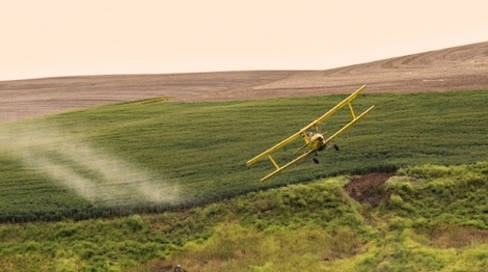
Center for Food Safety announces it will pursue all available legal options to stop commercialization
Washington, DC–(ENEWSPF)–September 17, 2014. Center for Food Safety today condemned the U.S. Department of Agriculture’s (USDA) decision to fully deregulate Dow Chemical’s Enlist corn and soybeans, genetically engineered to withstand repeated spraying of the herbicide 2,4-D. The Environmental Protection Agency (EPA) has yet to approve the accompanying herbicide, which is a blend of 2,4-D and glyphosate.
“2,4-D resistant crops pose a monumental threat to our nation’s agricultural, environmental and human health. With this approval comes millions of more pounds of toxic herbicides dumped onto our land; it’s an unacceptable outcome,” said Andrew Kimbrell, executive director for Center for Food Safety. “Center for Food Safety will pursue all available legal options to stop the commercialization of these dangerous crops.”
2,4-D (2,4-dichlorophenoxyacetic acid), produced by Dow Chemical, was a component of “Agent Orange,” the toxic defoliant used in Vietnam. 2,4-D and other herbicides of its class have been independently associated with deadly immune system cancers, Parkinson’s disease, endocrine disruption, and reproductive problems.
Dow Chemical developed 2,4-D resistant crops as a solution to glyphosate-resistant weeds generated by first-generation GE crops from Monsanto, known as Roundup Ready. Roundup Ready crops triggered a massive increase in use of glyphosate, followed by an epidemic of glyphosate-resistant weeds. Though Dow claims 2,4-D crops are the solution to weed resistance, a recent peer-reviewed study published in the prestigious journal Bioscience concludes that these new GE crops will instead pour oil on the fire by triggering still more intractable weeds resistant to both glyphosate and 2,4-D.
“This is not the solution to our superweed problem and will only spur the evolution of yet more herbicide-resistant weeds,” said Kimbrell. “We need a new direction for our agricultural system, not increased reliance on chemicals.”
USDA’s own analysis admits that approval of 2,4-D-resistant corn and soybeans will lead to an unprecedented 2 to 7 fold increase in agricultural use of 2,4-D by 2020, from 26 million to as much as 176 million lbs. per year. Even at current use levels, 2,4-D drift is responsible for more episodes of crop injury than any other herbicide.
Source: http://www.centerforfoodsafety.org








